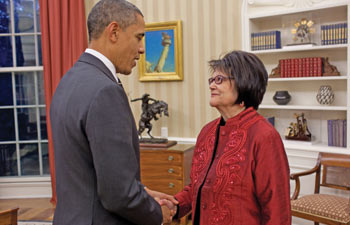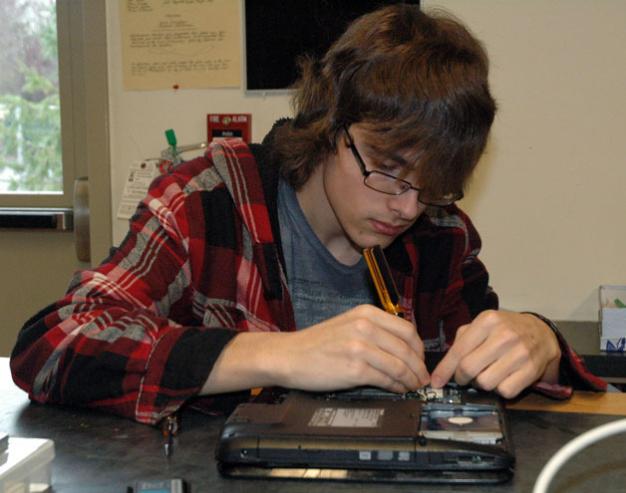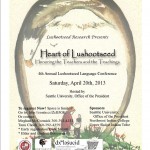By Ralph Richardson, Indian Country Today Media Network
In our highly competitive global economy, learning a new language is back in vogue, whether it’s Spanish, Mandarin, Arabic—or Cherokee. There are a plethora of programs, applications and schools to help people hone their communication abilities. Now comes a new strategy: Don Thornton, founder and president of Thornton Media, Inc. and a member of the Cherokee Nation of Oklahoma, has developed Talking Games, the first 3-D video game that teaches language.
“The problem is that too many language courses are sitting on shelves gathering dust,” Thornton says. “The reason is boredom. You simply can’t get the player to continue using the game for hundreds of hours because they are bored. We intend to make language learning more fun.”

Thornton has utilized new technology to help preserve the language of his ancestors. “Our video game model is a true paradigm shift in the language software industry,” he claims. “It’s a disruptive technology advance that will change the way all languages are learned.”
Thornton says his grandmother, Lucinda Robbins, taught Cherokee in her home-town of Tahlequah, Oklahoma for 40 years. “While visiting her I purchased a Cherokee-English dictionary near her home, which I showed to her for her opinion,” he recalls. “She flipped through it and said she knew the professor who wrote it and commented that he used to ‘come over and ask me how to say words when I was sitting on my porch.’”
Eventually the professor didn’t even bother to sit on Robbins’ porch and “would just drop off lists of words and she would fill them out for him. He did this for three years. I flipped through the dictionary thinking at least he must have thanked her profusely for her help. But her name didn’t appear anywhere in the book. She told me about many similar projects that she had worked on. She translated books for people into Cherokee, and had a request to narrate the entire New Testament—a two-year project. At no time did she ever get paid for these major projects or even receive a copy of the work. It got me thinking how Indians don’t have control over their own cultural property and must rely on others.”
Determined to bring Cherokee back to the Cherokee, Thornton says he “started the company by adapting the world’s first ‘smart toy’ to teach an indigenous language.” He claims that development of Talking Games has created many “endangered language firsts,” including the first handheld translator, first two-way translator, first Nintendo DS language-learning apps, first language learning apps in the iTunes Store, and first language learning video game for an endangered language.
“All of the R&D for these projects was paid for out-of-pocket,” Thornton states proudly. “No grants. We have created custom language tools for more than 170 tribes and First Nations.”
All of this came from his desire to honor his grandmother, who, he says, “died in December 2012 at the age of 92. She was the best Cherokee speaker in our family.”

Earlier this month, Thornton was a speaker on the panel “Mobile Devices and Indian Country” at the National Reservation Economic Summit 2013 Conference with Jamie Richardson, senior systems engineer for Apple Inc. “The conference brings together American Indian businesses and corporations,” Thornton says. “I was the only panelist invited to speak with Apple about mobile apps.”
Despite his successes, Thornton still needs the support of Indian country to continue his work. His Kickstarter campaign launched on March 11, and his goal is to produce his game in both Cherokee and Spanish. Thornton hopes the inclusion of Spanish, which he says is the most requested second language in the country, will subsidize the inclusion of Cherokee. “If we are successful in launching this project it will benefit the revitalization of all endangered languages,” he says.
TRANS TK. e future for Talking Games looks bright, because the game Thornton has developed is engaging and fun. Users fight zombies, wrestle Bigfoot, and escape from aliens—all while learning a language. “The virtual world we create for Talking Games is not meant to simply recreate a town or community, but to create a ‘suspension of disbelief,’” Thornton says. “We want the player to sort of’ forget they are playing a game. This is the reason for the amazing addictive power of immersive video games. When you read a great book or see a great movie, you become lost in it, and part of your brain actually forgets you are playing a game. We use 3D characters that you interact with in our virtual world.”

No special glasses or equipment are required to play Talking Games. It is a role-playing game, or RPG, with 3D characters that exist in 3 dimensions, like Grand Theft Auto. In Talking Games, the player controls the main character, Charlie Vann, gets a head injury in a car crash and forgets how to speak Cherokee. His family and friends must help him to regain his language. The obstacles he must overcome include zombies, Bigfoot, and aliens. “The problem with most ‘serious games,’ Thornton says, “is that the motivation to play the game is external. You are ordered to play the game by your superiors, for instance. There are no internal motivators to play, making the game fun to play.”
Talking Games also differs from other language learning programs in that users must speak to play the game. In addition, Talking Games provides what Thornton calls an “immersion environment.” Virtual characters can only respond to the language the user speaks. These aspects of the Talking Games system create a richer learning environment.
Thornton says he has commissioned third party studies on 25,000 military personnel learning Arabic that show that video games that teach languages are “more effective than traditional methods” of language learning. “When you attempt to learn a new language, one of the biggest fears is that you will speak incorrectly and will be laughed at,” he explains. “There is a moment where you look the other person in the eye to see if they understood you. Some people are not bothered by making mistakes in public, but most people feel very uncomfortable if they make a mistake. Talking Games provides a safe environment to practice basic conversation. If you make a mistake in front of a video game character, it’s really not that big of a deal.”

This innovator in the area of language learning says he launched Thornton Media in 1995 “to create custom language tools to help indigenous communities to revitalize their languages while retaining control over their own cultural property.” Now, Thornton says, his company is still the “only language tool company in the world that retains no ownership over the cultural property of our Native communities.”
With the introduction of Talking Games, Thornton says he has expanded his goals to promote accelerated learning of all languages—but the heart and soul of his company remains with the languages of original peoples, like his grandmother. “Part of our efforts and profits,” he says, “will always be devoted to the revitalization of endangered languages.”
Support Thornton Media’s Kickstarter campagin at http://kck.st/WhweWy.
Read more at http://indiancountrytodaymedianetwork.com/2013/03/22/thornton-media-launches-kickstarter-campaign-3-d-video-game-teach-new-languages-including














